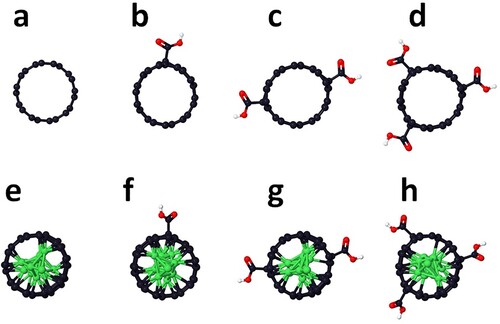Matnazarova Sh, Khalilov U, Yusupov M
Carbon nanotubes (CNTs) have been successfully used in biomedicine, including cancer therapy, due to their unique physico-chemical properties. Because pristine CNTs exhibit hydrophobic behaviour, they can have a cytotoxic effect on cells, which limits their practical use in biomedicine. The toxicity of CNTs can be reduced by adding water-soluble functional radicals to their surface, i.e. by increasing their hydrophilicity. Another possibility for increasing the hydrophilicity of CNTs is probably filling them with endohedral metal atoms, which has not yet been studied. Thus, in this study, we use computer simulations to investigate the combined effect of endohedral nickel atoms and functional groups on the hydrophilicity of CNTs. Our simulation results show that the introduction of endohedral nickel atoms into CNTs increases their binding energy with functional groups. We also find that the addition of functional groups to the surface of CNT, along with filling it with endohedral nickel atoms, leads to an increase in the dipole moment of the CNT as well as its interaction energy with water, thereby increasing the hydrophilicity of the CNT and, consequently, its solubility in water. This, in turn, can lead to a decrease in CNT toxicity.

